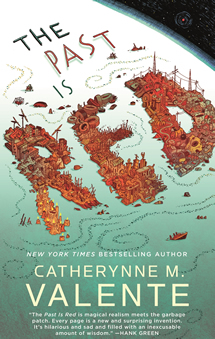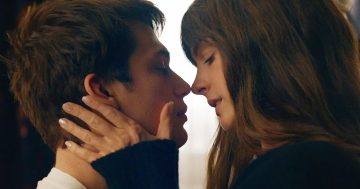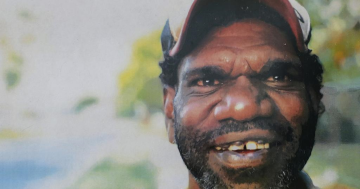Reviewed by Robert Goodman.
By Catherynne M Valente, Pan Macmillan.
 Just when you think the post-apocalyptic narrative might have become a bit stale, along comes Catherynne M Valente to blow it out of the water. Which is not surprising for an author who has been shortlisted for every major science fiction and fantasy award going and whose back catalogue is as eclectic as it is engaging. Just as an example, she followed up her five-volume Fairyland series (starting with The Girl Who Circumnavigated Fairyland in a Ship of Her Own Making) with her 2016 weird decopunk paean to the silent movie era Radiance, and, more recently, Space Opera, a science-fiction homage to the Eurovision Song Contest. Which brings us to The Past is Red, a post-apocalyptic environmental fable with as much bad language as it has heart.
Just when you think the post-apocalyptic narrative might have become a bit stale, along comes Catherynne M Valente to blow it out of the water. Which is not surprising for an author who has been shortlisted for every major science fiction and fantasy award going and whose back catalogue is as eclectic as it is engaging. Just as an example, she followed up her five-volume Fairyland series (starting with The Girl Who Circumnavigated Fairyland in a Ship of Her Own Making) with her 2016 weird decopunk paean to the silent movie era Radiance, and, more recently, Space Opera, a science-fiction homage to the Eurovision Song Contest. Which brings us to The Past is Red, a post-apocalyptic environmental fable with as much bad language as it has heart.
The first part of this short novel is titled ‘The Future is Blue’ and started life as a standalone short story about a post-apocalyptic world in which a girl called Tetley Abadnego lives in a place called Garbagetown and spends her days being abused by her fellow residents. Garbagetown is a floating collection of all of the remnants of our civilisation and is one of the remaining settlements on a drowned Earth. Based on the very real Pacific Garbage Patch, Valente imagines that patch has grown immensely and the garbage has been sorted to form individual neighbourhoods (such as Candle Hole, Scrapmetal Alley, Pill Hill, Toyside, Teagate, and Electric Town) that are home to some of the last remnants of humanity who survive on whatever they can scavenge. Even this does not take too much imagination, as there are plenty of places in the world, even now, where communities live on the refuse of others (a situation highlighted in Hwang Sok-Yong’s 2017 novel Familiar Things).
‘The Future is Blue’ tells Tetley’s story and explains why she gladly accepts the punishments of her community. The second half of the novel, ‘The Past is Red’, takes Tetley out into the wider world of Garbargetown to continue her story. This section is told from a place of exile where Tetley only has one person to speak to – Big Red Mars – who, she admits, she hates 66 per cent of the time (and loves for the remainder). The identity of Big Red is ambiguous at first and is one of the many gut-punch reveals of the second half of the novel.
In most post-apocalyptic tales, our current age is lionised for its freedoms and possibilities. In Tetley’s world, this is not the case. Valente says that she ‘wanted to write about a post-apocalyptic world where our civilisation was not looked back on with awe and admiration’. And she succeeds. The generation of 50 years before, referred to throughout the book as the Fuckwits, is clearly seen as the generation that ‘wrecked a perfect biosphere because we couldn’t be bothered not to’. While the people of Garbagetown get on with their lives, they are also resentful and more than a little envious of the past:
‘I want to use up a whole toothpaste tube and throw it away with three-quarters left in the bottom because I’ll just buy more tomorrow. I want to put my clocks forward in spring and complain about it. I want to have to watch what I eat because it’s so easy to get fat. I want to go where everybody knows my name …’
Babybel sobbed. ‘I want to ruin everything! That’s my birthright!’
In her Afterword, Valente says Tetley Abadnego is deliberately intended to be a Candide-style character. Tetley believes in herself and always sees the positive. She is a person who, even after being struck for a wrong she admits to having committed, will honestly say: Thank you for your instruction. Tetley sees beauty in everything, including her home:
Garbagetown is the most wonderful place anybody has ever lived in the history of the world, even if you count the Pyramids, New York City and Camelot … Candle Hole is the most beautiful place in Garbagetown, which is the most beautiful place in the world. All of the stubs of candles the Fuckwits threw out piled up into hills and mountains and caverns and dells, votive candles and taper candles and tea lights and birthday candles and big fat colour pillar candles, stacked and somewhat melted into a great crumbling gorgeous warren of wicks and wax.
And Tetley has a deep wellspring of optimism and fairly realistic hope:
… the kind of hope I have isn’t just greed by its maiden name. The kind of hope I have doesn’t begin and end with demanding everything go back to the way it was when it can’t, it can’t ever, that’s not how time works, and it’s not how oceans work either … I have hope for Garbagetown …
The Past is Red is a short read but Valente, as always, makes every word count. This is a novel of hope and resilience but it is also an excoriating takedown of commercialism and the inertia that we have fallen into in dealing with the environment. Tetley’s optimism for the future may demonstrate that as humans we have the capacity to deal with anything. But it should also make readers feel guilty enough about what future generations may have to face to rethink some of their attitudes – and actions.
This review first appeared in Newtown Review of Books.











